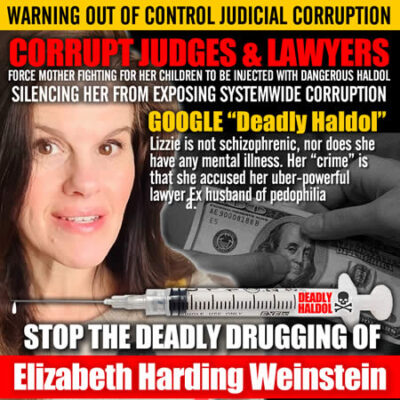HELP Stop the forced Dangerous Haldol Drugging of a Mother fighting for her children

December 12 2022 Haloperidol is a typical antipsychotic drug. This drug is still widely used in emergency medicine, psychiatry, and general medicine departments. It is mostly used for acute confusional state, psychotic disorders, agitation, delirium, and aggressive behaviour. Overdose of haloperidol can cause sudden deaths. Cardiopulmonary arrest related to use of haloperidol had been reported in literature as case reports but are very few. No such cases have been reported in India till now. We report a case of cardiac arrest due to the use of haloperidol. Case number is 900327-22 Elizabeth Harding Weinstein More on Elizabeth Harding Weinstein Court Watch: Lizzie to be Involuntarily Drugged Virtual Hearing (apparently) Open to Public Who: Elizabeth Harding Weinstein What: Hearing in New York Court to order her to be drugged over her objection When: Monday, December 12, 2022 at 10:30 AM EST / 7:30 AM PST Where: LIVE STREAM LINK. Passcode: 1212. Below is from Barbara Stone via email: Background: As many of you know, Lizzie Harding Weinstein was falsely incarcerated using a void illegal ‘restraining order”. The void order had expired but as we know, our country is lawless. So now, the government has kidnapped her into a “psyche” facility to obtain more money from the federal government to traffic her. The psyche facility is seeking to hold her longer than “ordered” by void order. This hearing is so they can keep her kidnapped and forcibly drug her. WE NEED MASSIVE attendance at the virtual hearing. I thought each of us would have to register but I pre-registered and it seems like everyone can use the same link that was sent to me below. If it becomes necessary for everyone to separately register,, I have and will send the instructions and… Read More




